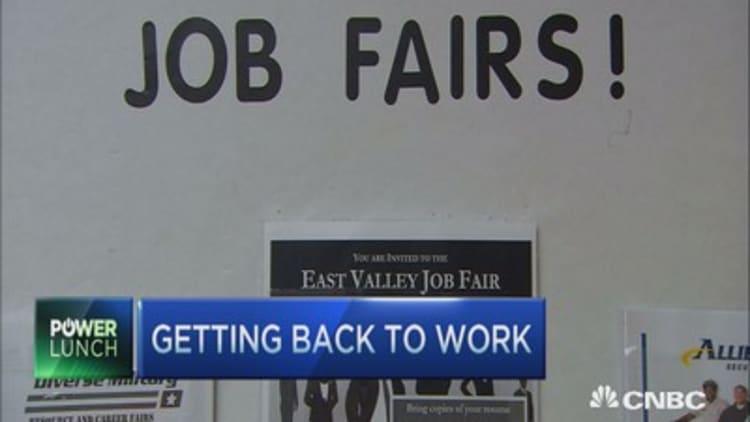
If you're looking for a new job with a good mix of work- and personal-life attributes, explore west of the Mississippi River.
The top 10 places for jobs all are in cities dotting the western two-thirds of the country, according to a recent study conducted by WalletHub.com. In fact, you have to scroll down to No. 17 to get to an East Coast city: Raleigh, North Carolina.
The top cities "have more variety of industries than a lot of East Coast cities," said Jill Gonzalez, spokesperson for WalletHub.com. "Most of the top cities also have [a majority of] employees with insurance through work."
WalletHub ranked the 150 most-populated U.S. cities using 16 metrics that ranged from job openings and poverty rates to crime rates, housing affordability and nightlife options.
Read MoreOverseas jobs pose risks
Topping the list is a city almost as far west in the U.S. mainland you can go: Seattle.
The Emerald City, which also is one of the fastest-growing cities and the country's 21st largest, boasts a variety of large employers, like Amazon, Starbucks and Nordstrom. About 30 minutes away, in Redmond, Washington, is Microsoft.
Commutes, cost of living count
The study also said that the average one-way commute for Seattle workers is 25.4 minutes and 85.3 percent of workers have insurance through their employers.
Workers in Seattle earn a median salary of $65,277, according to 2013 data from the U.S. Census Bureau. Adjusted for cost of living, however, that number drops to $54,957, according to the WalletHub report. The national median is $53,046.
Taking a city's cost of living into consideration is crucial when job hunting, as $50,000 in some places has as much purchasing power as $100,000 in more costly places.
For instance, the median value of homes in Seattle is $433,800. That compares to $176,700 nationally and $118,200 in Des Moines, Iowa, which ranked second overall in the WalletHub list.
With a population roughly a third the size of Seattle's 652,000 people, Des Moines boasts an annual job-growth rate that ranks among the fastest in the country, at 2.73 percent.
Its workforce is also spread across a variety of industries, which WalletHub used as a metric in its study. Additionally, 76.9 percent of workers have work-based health insurance. Its median annual income is $49,646, adjusted for cost of living.
Ranking third on the WalletHub list is America's largest incorporated town, with a population of 230,000: Gilbert, Arizona.
Located about 30 minutes from Phoenix, Gilbert's population has doubled every five years since 1980.
Read MoreTop 5 cities for jobs
Although its cost of living is above the national average, its adjusted median household income stands at $76,276. The median value of homes in Gilbert is $225,800.
Other pluses: 86.2 percent of workers are insured through work, and Gilbert has a low crime rate as well as a low unemployment rate: 2.7 percent for workers with at least a bachelor's degree, and 4.9 percent for those with only a high school diploma.
Ranking fourth on the list is Sioux Falls, South Dakota. The city, with a population of 164,676, boasts the lowest unemployment rate for college grads (1.7 percent). The unemployment rate for high school is 5.1 percent. On the plus side, the average commute time is just 16.9 minutes and 84.1 percent of workers have insurance.
The median household income in Sioux Falls stands at $49,495; the median home value is $132,400.
In fifth place is Fremont, California, whose population is 224,922. Located near Silicon Valley, the city boasts a median salary of $71,593 (adjusted for cost of living). Its starting monthly salary, $3,714, also is above average. Additionally, 88.5 percent of workers have health insurance.
However, the city's cost of living far outpaces the national average, as illustrated in its housing costs: The median home price in Fremont is $600,300, which is more than three times the national average.
Read MoreTips for career changers
Certified financial planner Ben Tobias emphasized the importance of considering the cost of living by sharing his own experience when, several decades ago, he moved from New York to Miami and his salary remained unchanged.
"My net pay went up greater than what any kind of salary increase would have been, just because I no longer had to pay New York City and New York State income taxes," said Tobias, president of Tobias Financial Advisors. "My standard of living increased significantly, while my savings also increased."
Some cities have a stigma that they shouldn't. With Washington, D.C., some people think if they head there, they can only work in politics.Jill Gonzalezspokesperson for WalletHub.com
Financial advisors also caution that when relocating to an unfamiliar city, wait a while before purchasing a home.
"You won't know traffic patterns, and it might take you six months or a year to get the lay of the land," said Niv Persaud, a CFP and managing director of Transition Planning & Guidance. "And while you wait, you can put money into your emergency reserves so you'll have a cushion when you do decide to buy a house."
Rounding out the top 10 cities for jobs on the WalletHub list were Chandler, Arizona, in sixth place; Omaha, Nebraska, in seventh; Salt Lake City, eighth; Scottsdale, Arizona, ninth; and Plano, Texas, in tenth.
Looking solely at job opportunities—job openings minus the number of unemployed people—the nation's capital ranks first. But its cost of living is high, and it's possible that potential workers have a narrow view of Washington, D.C., making it harder to fill its available jobs.
Top 10 cities for jobs
1. Seattle
2. Des Moines, Iowa
3. Gilbert, Arizona
4. Sioux Falls, South Dakota
5. Fremont, California
6. Chandler, Arizona
7. Omaha, Nebraska
8. Salt Lake City
9. Scottsdale, Arizona
10. Plano, Texas
Source: WalletHub.com
"Some cities have a stigma that they shouldn't," said Gonzalez of WalletHub. "With Washington, D.C., some people think if they head there, they can only work in politics. Or they think if they head to San Francisco, they can only work in technology."
Meanwhile, America's two largest cities fall at the very bottom of the job-opportunity list: Los Angeles and New York. And yet these cities continue to grow despite the tougher local job market.
"If you look at the cities with some of the worst numbers, they still are places that people head to anyway," Gonzalez said.
—By Sarah O'Brien, special to CNBC.com




